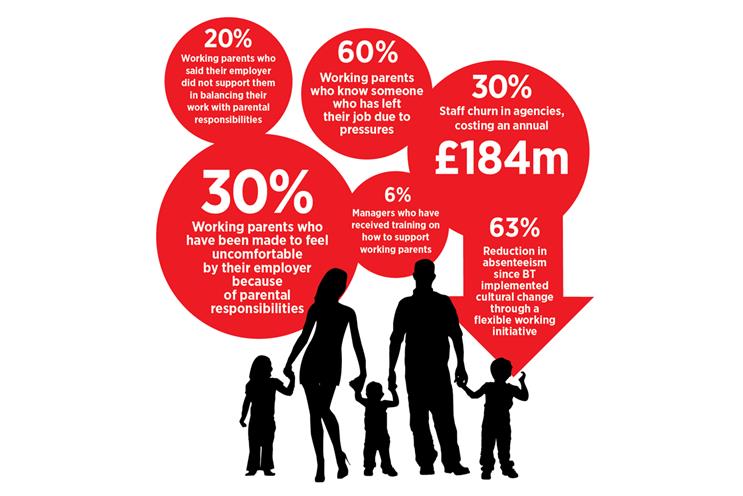
When more than 30 per cent of working parents told us in our latest survey that they have been made to feel uncomfortable by their employer because of parental responsibilities, I was shocked. Twenty per cent said their employer did not support them in balancing their work with parental responsibilities, and 60 per cent know someone who has left their role because of the pressures that come with being a working parent. We clearly have a lot of work to do.
We have fantastic initiatives, such as The 3% Conference and the IPA’s "here for good" agenda, that aim to improve diversity in our industry. The movement towards greater inclusivity within our workplaces is stronger than ever. So why do we seem to be getting it so wrong for working parents? Given that there is a 30 per cent staff churn in agencies – costing £184 million a year, according to the IPA – you would expect a stronger desire to change.
Have the business-benefit arguments not been made clearly enough yet? Nabs’ Working Parents Initiative White Paper investigated what we can do to support parents in the workplace by looking at how different companies operate. It found strong evidence of more productive workforces, financial and competitive advantage and greater di-versity when working parents were effectively accommodated for with flexible working opportunities. Vodafone’s Flexible: Friend Or Foe? survey found that 61 per cent of organisations that introduced flexible working policies saw their profits increase and 83 per cent saw an increase in productivity.
Do we think it is just too difficult to change culture? MediaCom, Starcom Mediavest Group and Rufus Leonard all presented case studies at the Nabs Working Parents Initiative launch event, demonstrating that, to make culture change happen, you need to embed it at the core of your business. You need buy-in from top to bottom, the right metrics and enough mettle to take on that challenge.
The key is to start with some principles, hold trials and evaluate your progress. And if you succeed in changing the culture, you can reap the rewards. When BT implemented cultural change through its flexible working programme, it reduced absenteeism by 63 per cent, lowered churn by 20 per cent, cut HR costs by £3 million and increased overall productivity.
Have we cut our training budgets back so far that we are missing out on training new managers to be managers? Our report found that only 6 per cent of managers have received any training or direction on how to manage and support parents in their teams. Yet our report also revealed that an employee’s relationship with their direct manager is the single most important factor in strong employee engagement. I remember my training when I first became a manager at Brann Worldwide – it was a godsend and has helped me throughout my career.
Are we afraid to get things wrong? Some of this is trial and error. Different parents want different ways of working and have different needs. And, yes, there’s always an element of risk involved when trying to change the way you work. We take risks every day in business, so why be afraid of taking risks when it comes to supporting working parents?
Are we not applying the insights we have around changing demographics and "tribes"? We share that knowledge with our clients all the time, but it applies equally to our own workforces. The next generation of leaders have different demands and needs when it comes to their working lives. We need to know what these needs are and do our best to meet them.
We’ve surveyed, we’ve scratched our heads and we’ve come up with some conclusions. This is what we think: if you do these four things well, you will find yourself with a happier, more committed workforce:
- Adopt flexible working practices.
- Train your line managers and leadership teams.
- Acknowledge the changing roles of mothers and fathers.
- Introduce culture-changing initiatives that benefit parents and your business, including the creation of working-parent communities and identification of realistic role models in your company.
In the past year, Nabs has seen a 67 per cent increase in calls for emotional support. This has set us on our journey to build an industry that truly believes, and demonstrates, that vital to its own success is the well-being of its people.
We have an opportunity to make things better for our staff. This report shows us how much more we need to do to make sure that a crucial part of our workforce is supported.
So join the conversation, download the report, share what has worked for you and think through how to implement our recommendations in your workplace. Only by rethinking the way we work and being open to change can we help parents be the best they can be at work and at home.
Diana Tickell is the chief executive of Nabs

